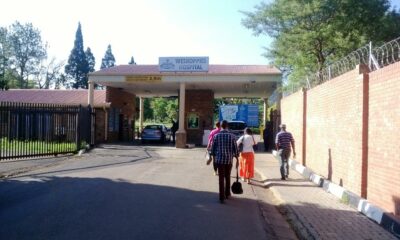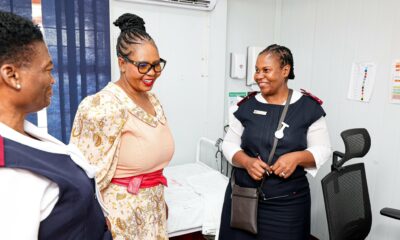News
Cancer Patients Can’t Wait: Court Forces Gauteng Health to Deliver Radiation Treatment Now

The crisis that hit breaking point
For years, whispers about Gauteng’s cancer crisis have echoed through waiting rooms, hospital corridors, and advocacy reports. Behind those whispers are real people: fathers, mothers, sisters, and children who were told radiation could save them but then spent months, even years, on waiting lists.
In 2025, those whispers finally reached the High Court in Johannesburg. Judges didn’t just criticise the Gauteng Department of Health; they ruled that its failure to provide radiation oncology services was unlawful and unconstitutional. The message was sharp: cancer patients do not have the luxury of time.
How did we get here?
The backlog isn’t new. Hospitals like Charlotte Maxeke Johannesburg Academic Hospital and Steve Biko Academic Hospital have struggled for years with broken machines, staff shortages, and mismanagement. By late 2023, it was reported that about 3,000 patients were waiting for cancer treatment, some for more than three years.
The province had been given a lifeline: R784 million ring-fenced by the Gauteng Treasury to clear the backlog. But according to court papers, much of that money was either underspent or returned. R250 million meant to outsource services simply went back to Treasury unused. For patients, the result was devastating: tumours grew while files gathered dust.
Civil society stepped in. Cancer Alliance, represented by Section27, took the matter to court. Their argument was simple: failing to provide timely cancer treatment is not only a breach of medical ethics but also a violation of constitutional rights to life, dignity, and access to healthcare.
What the court decided
In March 2025, Acting Judge Van Nieuwenhuizen delivered the first ruling. He ordered Gauteng Health to take all steps necessary to provide radiation treatment. That meant refreshing the backlog list, outsourcing services if needed, and reporting back to the court.
But the Department appealed, arguing it was already taking steps. On 5 August 2025, Judge Fiona Dippenaar dismissed those claims, stressing that no evidence had been presented to show patients were actually receiving treatment. She enforced the ruling immediately, despite the pending appeal.
Her words were blunt: to delay would be the death knell for many.
The human cost of bureaucracy
The numbers don’t capture the heartbreak. Some patients have died while waiting. Others have seen early-stage cancers progress to incurable stages because the treatment window closed. Families describe years of “come back later” appointments and machines “under repair.”
On social media, #CancerJustice has become a rallying cry. Patients share photos of loved ones who passed away while waiting. Others post videos of ringing hospital phones with no answers. Public anger is directed not only at Gauteng Health but also at a system that seems to let mismanagement outpace human survival.
For many in Joburg, it feels like déjà vu, echoes of Life Esidimeni, of power cuts in operating theatres, of a province where rights exist in law but falter in practice.
What happens now
The court order is clear:
-
Within 45 days the backlog list must be updated and maintained.
-
Patients must begin treatment immediately, whether at public or private facilities.
-
Within three months, Gauteng Health must file progress reports, showing how many patients have been treated and how many remain.
-
Senior officials, including the MEC and hospital leadership, have been ordered to comply with the ruling and report on progress under court supervision.
Section27 and Cancer Alliance have promised to keep monitoring the situation. They want updates in plain sight, not hidden behind bureaucratic reports. Civil society is already preparing further action if the department drags its feet again.
Why this ruling matters
This case isn’t just about oncology. It’s about what happens when the gap between constitutional promises and lived realities grows too wide. South Africa’s Constitution guarantees the right to healthcare. But in practice, underfunding, corruption, and mismanagement often mean the poor and sick pay the highest price.
The High Court’s judgment is a precedent: rights delayed are rights denied. For cancer patients, treatment delayed is treatment denied.
A province on trial in the court of public opinion
Public anger is palpable. For many, this isn’t just a Gauteng story but a national one. South Africans are weary of seeing crises in electricity, water, education, and now healthcare handled with delays and excuses.
Joburg residents on X (formerly Twitter) ask bluntly: how can a province return hundreds of millions while people are dying in waiting rooms? Others call for heads to roll at the Department. Advocacy groups see the ruling as a line in the sand: if the state cannot act on something as urgent as cancer, what faith can people have in any public service?
The court has spoken, and the message is unmissable: cancer patients cannot wait. This ruling forces Gauteng Health to act with the urgency that illness demands. But in truth, it shouldn’t take a courtroom battle to remind us that every life matters.
For thousands still waiting in Joburg and beyond, the question now is simple: will this judgment finally bring action, or will more lives be lost to bureaucracy?
Also read: Gauteng court slams health department: cancer patients cannot wait any longer
Follow Joburg ETC on Facebook, Twitter, TikT
For more News in Johannesburg, visit joburgetc.com
Source: The Citizen
Featured Image: Forbes



























